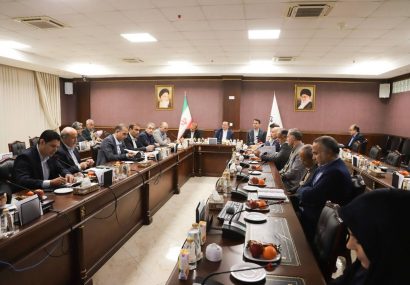Iran and Turkey to Establish Joint Free Trade Zone
TEHRAN (Iran News) Speaking at a high-level meeting with deputy ministers and managing directors of Iran’s Free Trade Zones (FTZs), Masroor announced that detailed studies and follow-up efforts are underway to create joint economic zones with Turkey, Pakistan, Azerbaijan, and Turkmenistan.
Masroor emphasized the importance of forming a joint free zone with Turkey and called for the establishment of an active Iran–Turkey working group to accelerate the initiative. He revealed that a key meeting with Turkish investors and representatives from Turkey’s FTZs is scheduled for July in one of Iran’s own free zones.
The idea of cross-border FTZs reflects Iran’s strategy to bypass sanctions and create new regional economic lifelines. Turkey, as Iran’s western neighbor and a major regional power, plays a strategic role in Iran’s trade plans, especially amid growing pressure on Iran’s economy due to international sanctions and limited access to global financial systems.
Masroor criticized the sluggish progress of certain free zone projects that have remained incomplete for over a decade, urging decisive and time-bound action. “There are development plans in some zones that have been left unresolved for 10 to 15 years. These issues require specialized task forces, but task forces alone are not enough. Problems must be addressed structurally and at their root,” he said.
He called on the heads of each FTZ to be directly involved in these task forces and ensure that tangible outcomes are achieved within six months. He also stressed that the overall investment climate in the free zones must improve significantly, with incentives for investors being approved and implemented without delay.
“Investment zones were created specifically to attract capital,” Masroor said. “What has been done in the past must now be followed by a visible leap forward.”
A key theme of Masroor’s remarks was the importance of investor satisfaction. He noted that new investors often base their decisions on the experiences of others, making responsiveness and results critical to sustained interest in the zones. He also stressed that the success of FTZs depends on the support of local communities.
“In regions where the local population is more actively present, their satisfaction is crucial. Investment projects must be transparent and clearly communicated to ensure local backing,” he said.
The Iranian government, now in its 14th administration, has reportedly placed greater emphasis on public service and community engagement as part of its development strategy. Masroor said that local satisfaction is now one of the key performance indicators for the FTZs.
Masroor reiterated that the FTZs are not meant to cater to domestic markets but are designed to drive export-led production. “These zones were created for production and export. Selling to the domestic market is not their purpose and can create complications,” he stated.
He urged zone managers to develop serious plans to attract knowledge-based companies, which he described as the “engine of production.” The zones are expected to provide tailored incentives and streamlined licensing processes to facilitate this.
Additionally, Masroor announced that executive guidelines for a new financial agency to support investment in FTZs would soon be issued. These agencies will act as facilitators to attract capital and provide financing solutions for projects within the zones.
Tourism was another focus of the meeting. Mehdi Mazinani, Deputy for Culture, Social Affairs, and Tourism, reported that the Aras Free Zone led the country in tourist attraction during the recent Nowruz holidays compared to the previous year.
Masroor also highlighted the need to improve tourism infrastructure, including addressing issues such as the electric power supply in Kish Free Zone and ensuring health services for visitors.
As Iran navigates complex regional and international dynamics, joint FTZs offer a potentially transformative tool for strengthening ties with neighboring countries, circumventing sanctions, and promoting economic resilience. However, success will depend on swift execution, meaningful investor support, and active engagement with local communities.
With the upcoming meeting with Turkish investors on the horizon, eyes are now on how fast these plans will materialize and whether Iran can deliver on its ambitious vision for economic revitalization through regional collaboration.
- source : irna






























